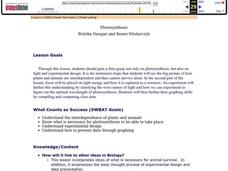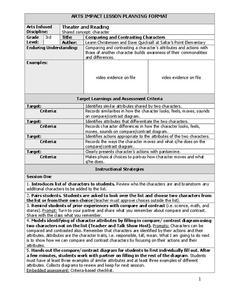Curated OER
Math: Who Makes an Epidemic?
Pupils calculate the threshold value for the number of susceptible people needed to create an epidemic. They examine a real life flu epidemic and use the SIR model to solve the problems. Students discover they can use mathematics to...
Curated OER
Tacoma Narrows Bridge Lesson Plans
Learners design and construct a suspension bridge. Math is used to compare the actual measurements of the bridge to the student's version.
Curated OER
Time and Motion on Track
Students create a motion diagram for a distance and motion project. In this time and motion lesson, students take turns walking around the track and take pictures of their motion. Students measure the distances and determine...
Curated OER
Mystery Liquids: Linear Function
High schoolers determine the linear equations of the density of water and oil by collecting data on the mass of various volumes of each liquid. They construct scatter plots from the data and use these to write the linear equations for...
Curated OER
Photosynthesis
Students recognize the importance of plants as they perform an experiment involving photosynthesis. Students determine the optimum wavelength of light for photosynthesis by exposing plants to different colors of light, collecting data,...
Curated OER
Perfumania
Students identify various geometric shapes. Apply the given formulas to determine the volume of these shapes. Design their own container to conform to specifications provided. Use their knowledge of volume formulas and shapes to compute...
Curated OER
Strawkets and Weight
Students investigate the effect that weight has on rocket flight. They construct a variety of straw-launched rockets that have different weights, observe what happens when the weight of a rocket is altered by reducing its physical size...
Curated OER
Appalachia
Young scholars investigate the benefits of dance and participate in dances. For this dance lesson, students investigate a number of dances such as square dancing and clogging that are native to Appalachia. They use math concepts to...
Teach Engineering
Rocks, Rocks, Rocks: Test, Identify Properties and Classify
Time is growing short. Teams work together to identify physical properties of rocks in order to determine the properties that would best suit their cavern shelter design.
Curated OER
Wildlife
First, biology pupils research land and marine habitats along the route of skipper Rich Wilson's Great American II. Then, using colored paper clips scattered across a colored paper background, they play the predator-prey game to...
Curated OER
Strum Along
Students engage in a instructional activity which takes something constructed by the class, that would be normally classified as just sound, then work together to make what can be perceived to be music. Students construct a basic...
Curated OER
Sculpture in Balance
Students discuss the difference betwen two-dimensional vs. three-dimensional art. In this art lesson plan, students discuss what symmetry or balance is in art and construct a symmetrical and an asymmetrical mobile.
Teach Engineering
Let's Take a Spin: One-Axis Rotation
Investigate the effect of one-axis rotations on geometric figures. Scholars learn to use snap cubes and the right-hand rule to draw figures after rotations about the x-, y-, or z-axes. They try their hands at examples created by the...
Curated OER
Community Action
Fifth graders decide how one uses resources within a particular bioregion. In this decision making lesson, 5th graders consider the biodiversity and complexity of the ecosystem. Students select a resource (water, paper,...
Curated OER
Flight Dreams - Folding into Flight
Combine measurement, following directions, physics, and art with one fun activity. Learners read a set of instruction to create three different kinds of paper airplanes. They measure, fold, and fly the planes, and record data and answer...
Curated OER
Tracking the Salt Front
Using the Hudson River as the focus, learners discuss the difference between salt water and fresh water environments, analyze maps and graphs, and complete addition and subtraction problems. This lesson comes with a wealth of...
Curated OER
Water Pressure Blaster
Third graders complete an experiment to introduce them to the concept of water pressure. In this water pressure lesson plan, 3rd graders create pressure in a water bottle and observe the force of water that is created.
Curated OER
Character Study
Third graders work in pairs to choose two characters and find their similarities and differences. In this character lesson, 3rd graders compare characters by their actions and attributes. Students individually complete a...
Teach Engineering
Concentrate This! Sugar or Salt...
Heat up your lessons on boiling points. The resource provides a three-part activity: first, groups find the boiling point of solutions; second, they create boiling point curves for salt and sugar solutions; and third, they mix a solution...
Prince William Network
Migration Headache
During this game, kids become migratory shorebirds and fly among wintering, nesting, and stopover habitats. If they do not arrive at a suitable habitat on time, they do not survive. Catastrophic events are periodically introduced that...
Curated OER
Climate and Periodic Functions: Science & Math Integration
Students complete a lab that introduce the scientific concept of climate on Earth. Following the lab, they complete further research on climate. Using average monthly temperatures students construct a mathematical model and analyze the...
Curated OER
Number Dribble
Students dribble and catch a ball. In this number dribble lesson students are given numbers and math equations that require them to dribble or throw the ball a specific number of times. The students practice dribbling independently and...
Curated OER
Life in the Arctic
Students create a model of an arctic animal. In this animal adaptation lesson, students research an arctic animal, create a 3-D model of their animal, and explain the physical characteristics animals in the arctic need to survive.
Curated OER
The Louis Vuitton Project, using 3rd degree equations
Students model three-dimensional objects using cubes. In this geometry lesson, students calculate the volume and derived the amount mathematically. They use different objects to create two and three-dimensional objects.























